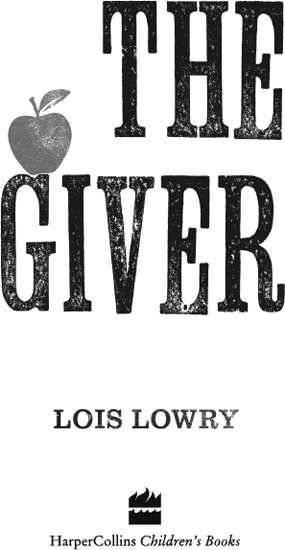
Полная версия:
The Giver, Gathering Blue, Messenger, Son

The Giver Quartet: The Giver, Gathering Blue, Messenger and Son
Lois Lowry

Copyright
The Giver: FIrst published in the USA by Houghton Mifflin in 1993.
First published in Great Britain by HarperCollins in 1994.
Published by HarperCollins Children’s Books in 2008.
Gathering Blue: Published in the United States by Houghton Mifflin Books for Children, an imprint of Houghton Mifflin Harcourt Publishing Company in 2000.
Messenger: First published in the USA by ‘Houghton Mifflin Books for Children’ an imprint of Houghton Mifflin Harcourt in 2004.
Son: Published in the United States by Houghton Mifflin Books for Children, an imprint of Houghton Mifflin Harcourt Publishing Company in 2012.
First published in Great Britain by HarperCollins Children’s Books in 2014
HarperCollins Children’s Books is a division of HarperCollinsPublishers
77–85 Fulham Palace Road,
Hammersmith, London W6 8JB
www.harpercollins.co.uk
Copyright © Lois Lowry 2014
Cover design by Charles Brock, Faceout Studio
The Giver: Text copyright © Lois Lowry 1993; A note from the author copyright © Lois Lowry 2003; Why You’ll Love This Book copyright © Margaret Mahy 2008
Gathering Blue: Copyright © Lois Lowry 2000; Cover design by Charles Brock, Faceout Studio
Messenger: Copyright © Lois Lowry 2004; Cover design by Charles Brock, Faceout Studio
Son: Copyright © Lois Lowry 2012; Cover design by Charles Brock, Faceout Studio
Lois Lowry asserts the moral right to be identified as the author of this work.
A catalogue record for this book is available from the British Library.
All rights reserved under International and Pan-American Copyright Conventions. By payment of the required fees, you have been granted the non-exclusive, non-transferable right to access and read the text of this e-book on-screen. No part of this text may be reproduced, transmitted, down-loaded, decompiled, reverse engineered, or stored in or introduced into any information storage and retrieval system, in any form or by any means, whether electronic or mechanical, now known or hereinafter invented, without the express written permission of HarperCollins.
Source ISBN: The Giver 9780007369881, Gathering Blue 9780007597277, Messenger 9780007597291, Son 9780007597314
Ebook Edition © 2014 ISBN: 9780007597321
Version: 2014-07-18
Table of Contents
Cover
Title Page
Copyright
The Giver
Gathering Blue
Messenger
Son
About the Author
About the Publisher

Why You’ll Love This Book By Margaret Mahy
Lois Lowry is one of the most outstanding writers for children and young adults in the USA. She is well known for her stories about Anastasia Krupnik – funny stories that have been hugely popular with young readers since the first one was published in 1979.
Lois Lowry has said that she got the ideas for the Anastasia stories from remembering her own childhood and, later, from her own experiences as a parent. But The Giver is a very different sort of story from the stories about Anastasia. And it shows that Lois Lowry can write a sinister book as well as a funny one.
The Giver is possibly the most alarming story of all her books – a disconcerting book … a book for young adults and adults, rather than younger children, though good and thoughtful readers of perhaps eleven up could certainly read it with understanding and appropriately mounting apprehension.
Jonas, the hero of The Giver, lives a highly ordered life as a member of a group who describe themselves as “the community”. And, though Jonas is happy enough with his parents, his lively sister and his friends, he is also beginning to experience strange moments of visions … visions that belong to him alone. He is moving towards great changes, and we the readers move with him. We come to understand that the life lived within his community is ominous as well as protected. People around Jonas have chosen to live extremely ordered lives but, as the story unfolds, the reader comes to see that this order has a particularly dark side. Memories of colour and music for example have been surrendered. But these memories are not altogether lost. They are contained and held by a mysterious man called the Giver. A lot of the story deals with the relationship between Jonas and the Giver – a man who is beyond the community, and a container of those memories of feeling and colour which he can pass on to Jonas, who will (it is expected) become a Giver himself. In order to communicate with the present Giver Jonas is released from the rules that govern everyone else around him, so the story becomes very much a story of self realization – a self realization that is expected, ultimately, to enrich a group of people denied self realization themselves.
As for the ending – well, the reader has to make up his or her own mind about the ending. Is it realistic? Is it symbolic?
Lois Lowry has written a note about The Giver (which you can read at the end of this book), saying that she did not immediately realise that it was different from any other book she had written, until she started receiving letters from readers (mostly adults) in the outside world proving that the story was being widely read. Many people praised it but there were some towns that banned it from their schools and libraries. Lois had intended to write a children’s adventure story, but The Giver turned out to be more than that. While some people hated it, others admired it and in 1993 it won the Newbery Medal.
The Giver is a book that is hard to put down – a book that haunts the reader for days after it has been closed. Have a go!
Margaret Mahy
Margaret Mahy is one of the world’s best-loved authors, writing wonderfully funny children’s stories and ground-breaking novels for young adults. Margaret was awarded the Order of New Zealand in 1993 for her internationally acclaimed contribution to children’s literature and has twice won Britain’s Carnegie Medal for Children’s Literature, for her books The Haunting and The Changeover. In 2006, Margaret was presented with the prestigious Hans Christian Andersen Award.

For all the children To whom we entrust the future
Table of Contents
Cover
Why You’ll Love This Book By Margaret Mahy
Title Page
Dedication
Chapter One
Chapter Two
Chapter Three
Chapter Four
Chapter Five
Chapter Six
Chapter Seven
Chapter Eight
Chapter Nine
Chapter Ten
Chapter Eleven
Chapter Twelve
Chapter Thirteen
Chapter Fourteen
Chapter Fifteen
Chapter Sixteen
Chapter Seventeen
Chapter Eighteen
Chapter Nineteen
Chapter Twenty
Chapter Twenty-One
Chapter Twenty-Two
Chapter Twenty-Three
A Note from the Author
Spotlight on Lois Lowry

IT WAS ALMOST December, and Jonas was beginning to be frightened. No. Wrong word, Jonas thought. Frightened meant that deep, sickening feeling of something terrible about to happen. Frightened was the way he had felt a year ago when an unidentified aircraft had overflown the community twice. He had seen it both times. Squinting towards the sky, he had seen the sleek jet, almost a blur at its high speed, go past, and a second later heard the blast of sound that followed. Then one more time, a moment later, from the opposite direction, the same plane.
At first, he had been only fascinated. He had never seen aircraft so close, for it was against the rules for Pilots to fly over the community. Occasionally, when supplies were delivered by cargo planes to the landing field across the river, the children rode their bicycles to the riverbank and watched, intrigued, the unloading and then the take-off directed to the west, always away from the community.
But the aircraft a year ago had been different. It was not a squat, fat-bellied cargo plane but a needle-nosed single-pilot jet. Jonas, looking around anxiously, had seen others – adults as well as children – stop what they were doing and wait, confused, for an explanation of the frightening event.
Then all of the citizens had been ordered to go into the nearest building and stay there. Immediately, the rasping voice through the speakers had said. Leave your bicycles where they are.
Instantly, obediently, Jonas had dropped his bike on its side on the path behind his family’s dwelling. He had run indoors and stayed there, alone. His parents were both at work, and his little sister, Lily, was at the Childcare Centre where she spent her after-school hours.
Looking through the front window, he had seen no people: none of the busy afternoon crew of Street Cleaners, Landscape Workers and Food Delivery people who usually populated the community at that time of day. He saw only the abandoned bikes here and there on their sides; an upturned wheel on one was still revolving slowly.
He had been frightened then. The sense of his own community silent, waiting, had made his stomach churn. He had trembled.
But it had been nothing. Within minutes the speakers had crackled again, and the voice, reassuring now and less urgent, had explained that a Pilot-in-Training had misread his navigational instructions and made a wrong turn. Desperately the Pilot had been trying to make his way back before his error was noticed.
Needless to say, he will be released, the voice had said, followed by silence. There was an ironic tone to that final message, as if the Speaker found it amusing; and Jonas had smiled a little, though he knew what a grim statement it had been. For a contributing citizen to be released from the community was a final decision, a terrible punishment, an overwhelming statement of failure.
Even the children were scolded if they used the term lightly at play, jeering at a team-mate who missed a catch or stumbled in a race. Jonas had done it once, had shouted at his best friend, “That’s it, Asher! You’re released!” when Asher’s clumsy error had lost a match for his team. He had been taken aside for a brief and serious talk by the coach, had hung his head with guilt and embarrassment, and apologised to Asher after the game.
Now, thinking about the feeling of fear as he pedalled home along the river path, he remembered that moment of palpable, stomach-sinking terror when the aircraft had streaked above. It was not what he was feeling now with December approaching. He searched for the right word to describe his own feeling.
Jonas was careful about language. Not like his friend, Asher, who talked too fast and mixed things up, scrambling words and phrases until they were barely recognisable and often very funny.
Jonas grinned, remembering the morning that Asher had dashed into the classroom, late as usual, arriving breathlessly in the middle of the chanting of the morning anthem. When the class took their seats at the conclusion of the patriotic hymn, Asher remained standing to make his public apology as was required.
“I apologise for inconveniencing my learning community.” Asher ran through the standard apology phrase rapidly, still catching his breath. The Instructor and class waited patiently for his explanation. The students had all been grinning, because they had listened to Asher’s explanations so many times before.
“I left home at the correct time but when I was riding along near the hatchery, the crew was separating some salmon. I guess I just got distraught, watching them.
“I apologise to my classmates,” Asher concluded. He smoothed his rumpled tunic and sat down.
“We accept your apology, Asher.” The class recited the standard response in unison. Many of the students were biting their lips to keep from laughing.
“I accept your apology, Asher,” the Instructor said. He was smiling. “And I thank you, because once again you have provided an opportunity for a lesson in language. ‘Distraught’ is too strong an adjective to describe salmon-viewing.” He turned and wrote “distraught” on the instructional board. Beside it he wrote “distracted”.
Jonas, nearing his home now, smiled at the recollection. Thinking, still, as he wheeled his bike into its narrow port beside the door, he realised that frightened was the wrong word to describe his feelings, now that December was almost here. It was too strong an adjective.
He had waited a long time for this special December. Now that it was almost upon him, he wasn’t frightened, but he was … eager, he decided. He was eager for it to come. And he was excited, certainly. All of the Elevens were excited about the event that would be coming so soon.
But there was a little shudder of nervousness when he thought about it, about what might happen.
Apprehensive, Jonas decided. That’s what I am.
“Who wants to be the first tonight, for feelings?” Jonas’s father asked, at the conclusion of their evening meal.
It was one of the rituals, the evening telling of feelings. Sometimes Jonas and his sister, Lily, argued over turns, over who would get to go first. Their parents, of course, were part of the ritual; they, too, told their feelings each evening. But like all parents – all adults – they didn’t fight and wheedle for their turn.
Nor did Jonas, tonight. His feelings were too complicated this evening. He wanted to share them, but he wasn’t eager to begin the process of sifting through his own complicated emotions, even with the help that he knew his parents could give.
“You go, Lily,” he said, seeing his sister, who was much younger – only a Seven – wiggling with impatience in her chair.
“I felt very angry this afternoon,” Lily announced. “My Childcare group was at the play area, and we had a visiting group of Sevens, and they didn’t obey the rules at all. One of them – a male; I don’t know his name – kept going right to the front of the line for the slide, even though the rest of us were all waiting. I felt so angry at him. I made my hand into a fist, like this.” She held up a clenched fist and the rest of the family smiled at her small defiant gesture.
“Why do you think the visitors didn’t obey the rules?” Mother asked.
Lily considered, and shook her head. “I don’t know. They acted like … like …”
“Animals?” Jonas suggested. He laughed.
“That’s right,” Lily said, laughing too. “Like animals.” Neither child knew what the word meant, exactly, but it was often used to describe someone uneducated or clumsy, someone who didn’t fit in.
“Where were the visitors from?” Father asked.
Lily frowned, trying to remember. “Our leader told us, when he made the welcome speech, but I can’t remember. I guess I wasn’t paying attention. It was from another community. They had to leave very early, and they had their midday meal on the bus.”
Mother nodded. “Do you think it’s possible that their rules may be different? And so they simply didn’t know what your play area rules were?”
Lily shrugged, and nodded. “I suppose.”
“You’ve visited other communities, haven’t you?” Jonas asked. “My group has, often.”
Lily nodded again. “When we were Sixes, we went and shared a whole school day with a group of Sixes in their community.”
“How did you feel when you were there?”
Lily frowned. “I felt strange. Because their methods were different. They were learning usages that my group hadn’t learned yet, so we felt stupid.”
Father was listening with interest. “I’m thinking, Lily,” he said, “about the boy who didn’t obey the rules today. Do you think it’s possible that he felt strange and stupid, being in a new place with rules that he didn’t know about?”
Lily pondered that. “Yes,” she said, finally.
“I feel a little sorry for him,” Jonas said, “even though I don’t even know him. I feel sorry for anyone who is in a place where he feels strange and stupid.”
“How do you feel now, Lily?” Father asked. “Still angry?”
“I guess not,” Lily decided. “I guess I feel a little sorry for him. And sorry I made a fist.” She grinned.
Jonas smiled back at his sister. Lily’s feelings were always straightforward, fairly simple, usually easy to resolve. He guessed that his own had been, too, when he was a Seven.
He listened politely, though not very attentively, while his father took his turn, describing a feeling of worry that he’d had that day at work: a concern about one of the newchildren who wasn’t doing well. Jonas’s father’s title was Nurturer. He and the other Nurturers were responsible for all the physical and emotional needs of every newchild during its earliest life. It was a very important job, Jonas knew, but it wasn’t one that interested him much.
“What gender is it?” Lily asked.
“Male,” Father said. “He’s a sweet little male with a lovely disposition. But he isn’t growing as fast as he should, and he doesn’t sleep soundly. We have him in the extra care section for supplementary nurturing, but the committee’s beginning to talk about releasing him.”
“Oh, no,” Mother murmured sympathetically. “I know how sad that must make you feel.”
Jonas and Lily both nodded sympathetically as well. Release of newchildren was always sad, because they hadn’t had a chance to enjoy life within the community yet. And they hadn’t done anything wrong.
There were only two occasions of release which were not punishment. Release of the elderly, which was a time of celebration for a life well and fully lived; and release of a newchild, which always brought a sense of what-could-we-have-done. This was especially troubling for the Nurturers, like Father, who felt they had failed somehow. But it happened very rarely.
“Well,” Father said, “I’m going to keep trying. I may ask the committee for permission to bring him here at night, if you don’t mind. You know what the night-crew Nurturers are like. I think this little guy needs something extra.”
“Of course,” Mother said, and Jonas and Lily nodded. They had heard Father complain about the night crew before. It was a lesser job, night-crew nurturing, assigned to those who lacked the interest or skills or insight for the more vital jobs of the daytime hours. Most of the people on the night crew had not even been given spouses because they lacked, somehow, the essential capacity to connect to others, which was required for the creation of a family unit.
“Maybe we could even keep him,” Lily suggested sweetly, trying to look innocent. The look was fake, Jonas knew; they all knew.
“Lily,” Mother reminded her, smiling, “you know the rules.”
Two children – one male, one female – to each family unit. It was written very clearly in the rules.
Lily giggled. “Well,” she said, “I thought maybe just this once.”
Next, Mother, who held a prominent position at the Department of Justice, talked about her feelings. Today a repeat offender had been brought before her, someone who had broken the rules before. Someone who she hoped had been adequately and fairly punished, and who had been restored to his place: to his job, his home, his family unit. To see him brought before her a second time caused her overwhelming feelings of frustration and anger. And even guilt, that she hadn’t made a difference in his life.
“I feel frightened, too, for him,” she confessed. “You know that there’s no third chance. The rules say that if there’s a third transgression, he simply has to be released.”
Jonas shivered. He knew it happened. There was even a boy in his group of Elevens whose father had been released years before. No one ever mentioned it; the disgrace was unspeakable. It was hard to imagine.
Lily stood up and went to her mother. She stroked her mother’s arm.
From his place at the table, Father reached over and took her hand. Jonas reached for the other.
One by one, they comforted her. Soon she smiled, thanked them, and murmured that she felt soothed.
The ritual continued. “Jonas?” Father asked. “You’re last, tonight.”
Jonas sighed. This evening he almost would have preferred to keep his feelings hidden. But it was, of course, against the rules.
“I’m feeling apprehensive,” he confessed, glad that the appropriate descriptive word had finally come to him.
“Why is that, son?” His father looked concerned.
“I know there’s really nothing to worry about,” Jonas explained, “and that every adult has been through it. I know you have, Father, and you too, Mother. But it’s the Ceremony that I’m apprehensive about. It’s almost December.”
Lily looked up, her eyes wide. “The Ceremony of Twelve,” she whispered in an awed voice. Even the smallest children – Lily’s age and younger – knew that it lay in the future for each of them.
“I’m glad you told us of your feelings,” Father said.
“Lily,” Mother said, beckoning to the little girl. “Go on now and get into your nightclothes. Father and I are going to stay here and talk to Jonas for a while.”
Lily sighed, but obediently she got down from her chair. “Privately?” she asked.
Mother nodded. “Yes,” she said. “This talk will be a private one with Jonas.”

JONAS WATCHED AS his father poured a fresh cup of coffee. He waited.
“You know,” his father finally said, “every December was exciting to me when I was young. And it has been for you and Lily, too, I’m sure. Each December brings such changes.”
Jonas nodded. He could remember the Decembers back to when he had become, well, probably a Four. The earlier ones were lost to him. But he observed them each year, and he remembered Lily’s earliest Decembers. He remembered when his family received Lily, the day she was named, the day that she had become a One.
The Ceremony for the Ones was always noisy and fun. Each December, all the newchildren born in the previous year turned One. One at a time – there were always fifty in each year’s group, if none had been released – they had been brought to the stage by the Nurturbers who had cared for them since birth. Some were already walking, wobbly on their unsteady legs; others were no more than a few days old, wrapped in blankets, held by their Nurturers.
“I enjoy the Naming,” Jonas said.



